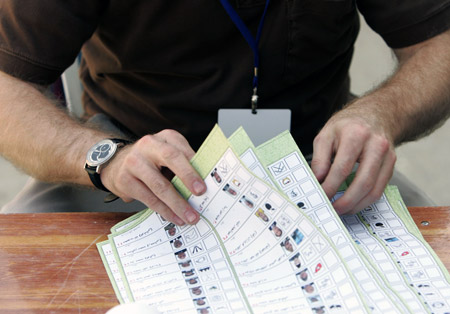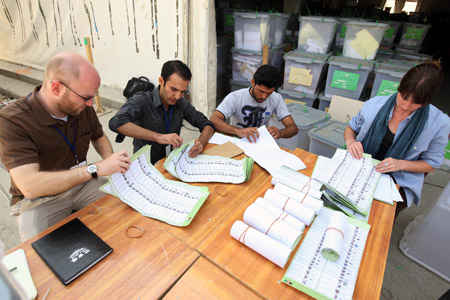By Hadi Mayar, Abdul Haleem
Afghanistan's sitting President Hamid Karzai confronts diverse challenges on internal and external fronts as he staggers towards his second term in office in the wake of the last month's presidential election marred by massive fraud allegations.
 |
|
A staff member of the U.N.-backed Electoral Complaints Commission (ECC) checks the "tainted" ballots at the office of the Independent Election Commission (IEC) in Kabul, capital of Afghanistan, Sept. 15, 2009. [Zabi Tamanna/Xinhua] |
According to the unofficial partial results, Karzai is leading far ahead of his major rival, winning enough vote percentage to avoid a runoff poll.
However, the enormous rigging charges, ranging from ballot-box stuffing to intimidation of voters, have drastically diminished the credibility of the ballot, casting doubt on his authority as a president commanding public support.
The Election Complaint Commission (ECC) has so far received over 2,800 complaints about election frauds, of which 726 have been deemed serious.
Last week, the commission invalidated votes in 83 polling stations in central, southern, and eastern Afghanistan, where Karzai had strong support.
Dr. Abdullah Abdullah, Karzai's major electoral rival, alleged the other day that the latter had manipulated the Independent Electoral Commission (IEC), claiming that election officials had colluded in fraud on Karzai's behalf.
Even Afghanistan's Western allies, particularly the United States and Britain, expressed their reservations about the election process last week.
Although Karzai was tipped as a potential winner before the election, opinion polls had showed him short of the absolute 51 percent majority, indicating that he might have to fight a runoff poll against his runner-up, Dr. Abdullah.
The rigging charges and international reservations have certainly put a question mark to Karzai's authority to steer his country out of heightening militancy, lack of governance, administrative corruption, economic crunch, drug trafficking, and lack of international credibility.
In an interview with the BBC World Services last week, Pakistani President Asif Ali Zardari accused that Afghanistan had a 5 billion US dollars narco-economy, which fed insurgency in the region.
The charge of narco-dollars stimulating insurgency in Afghanistan might be a little exaggerated, but there is no denying the fact that Afghanistan still remains the top suppliers for world narcotics market.
As for the Taliban insurgency, it has already grown out of proportion, making the month of August "the deadliest month of the deadliest year" ever since the breaking of war against Afghan militants in October 2001.
Admiral Mike Mullen, chairman of the US Joint Chiefs of Staff,earlier this month described the situation in Afghanistan as "serious and deteriorating".
In a CNN interview, Mullen said, "I don't think that threat is going to go away."
 |
|
Staff members of the U.N.-backed Electoral Complaints Commission (ECC) check the "tainted" ballots at the office of the Independent Election Commission (IEC) in Kabul, capital of Afghanistan, Sept. 15, 2009. [Zabi Tamanna/Xinhua] |
Gen. Stanley Mc Chrystal, the American NATO commander in Afghanistan, is in the final stage of his strategic review.
Media reports suggest that his proposed new strategy mainly hinges on increasing the number of Afghan soldiers and police to put them in the frontline of counter-insurgency efforts.
Under the existing plan, over 134,000 Afghan troops are to be trained by late 2011, but US officials said that number will need to be greatly increased.
While building capacity of the Afghan armed forces may prove a challenge for Karzai, he may also have to show his resolution on stopping civilian casualties in NATO and US forces' raids.
Last week, the Afghan and international media took a serious exception when NATO forces launched a drive to free a New York Time correspondent abducted and held hostage by militants in the northern Kunduz province.
Although the American forces succeeded?in freeing the Irish journalist, his Afghan colleague, a Germany-based student, was killed along with a woman and a child in the process.
British media reports said the militants had already agreed to free both the journalists.
The killing of over 70 people, mostly civilians, in Kunduz two weeks ago, had sparked massive criticism.
Economic woes, particularly poverty and unemployment, had remained the major issues coming into limelight during the election campaign.
Karzai will have to heal the wounds of his people. To surmount all these challenges, the new Afghan president will, however, first have to purge his administration, from top to grassroots level, of corruption and enhance its capacity to effectively take on the formidable challenges.
(Xinhua News Agency September 16, 2009)